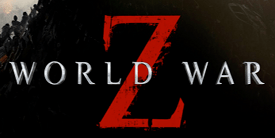Lately I’ve been curious about the prevalence of zombies in popular culture – they shuffle through music, movies, comics, TV shows. Recent TV shows like The Walking Dead and blockbuster movies like World War Z have brought zombies into the collective consciousness. World War Z is also a best-selling book by Max Brooks that is written as a documentary-like collection of survivor stories from the zombie apocalypse. Zombies play central roles in popular music too – Michael Jackson’s Thriller, The Cranberries Zombie, Buck 65’s Zombie Delight, and Roky Erickson’s I Walked With a Zombie covered by REM, to name just a few.
They congregate in groups and amble through city streets worldwide during the annual zombie walk.
Zombie Walk, Toronto.
Creative Commons licensed photo by Eric Parker.
I’ve attended one zombie walk in Vancouver, not as a participant but as a spectator. I was amazed by the number of people decorated and disguised as zombies. Such creative energy! They were hideous, ghoulish, frightening and disconcerting. Initially, I thought it was all a little silly and then multitudes made me uncomfortable as they moved as one and seemed to be in some kind of trance-like unison or group-think. At one point, I got fake blood splattered on my white shirt (who wears a white shirt to a zombie walk?!?) when a zombie bit into a gelatinous blob that looked like a brain. Ick!
CBC’s The Nature of Things recently aired an episode focused on parasites – Invasion of the Brain Snatchers. The show zooms in on a very particular life form that draws the essence of life from other creatures it invades, latches on to, and in some cases brainwashes – the parasite. The examples given are interesting and varied…the zombie ant that is controlled by a fungus to leave it’s colony, a flatworm that possess three different hosts (snails, fish, birds), and toxoplasma which can invade rats and humans and bring on radical personality changes. The zombie walk and some of the pop culture zombie references noted above were woven in and out of the narative thread of the show.
What does all this mean? Why are zombies hot and why now? One theory is that zombies represent an “expression of our culture’s enjoyment of seeing violence performed on seemingly deserving subjects.” (Zombies Are Us)
As we become more and more zombified, as our culture becomes ever more adept at amplifying our desires through advertising, pornography, and a media culture obsessed with gratifying every appetite, we can see the inevitable results of that process shambling along on their rotting legs. (Zombies Are Us)
In a 2011 New York Times Sunday Book Review editorial, Terrence Rafferty sees our preoccupation with zombies as a reflection of one of our greatest fears – an inherently racist fear of the other:
You have to wonder whether our 21st-century fascination with these hungry hordes has something to do with a general anxiety, particularly in the West, about the planet’s dwindling resources: a sense that there are too many people out there, with too many urgent needs, and that eventually these encroaching masses, dimly understood but somehow ominous in their collective appetites, will simply consume us.
In a September 2013 film review of the Hollywood blockbuster World War Z, David Banash makes connections between American isolationism, fear of the other, and US Senate policies.
The monster of the new millennium is without doubt the zombie, and the most remarkable thing about this is the utter lack of utopian imagination. In our newly chosen monster, there is no better world waiting. Our only hope is mere survival. (Every Era Gets a Monster)
Even the academics are getting into it and you know when academic books and papers are published on a topic, we should all pay attention. In a June 2013 Wired article, the author brings in quotes from two zombie scholars Sarah Juliet Lauro from Clemson University and Kyle Bishop from Southern Utah University. The article argues to understand a generation that you need look no further than it’s zombie movies. I know, I know…Wired is certainly not an academic paper but the author does draw on academics to take a stance.
And, finally Daniel W. Drezner, professor of international politics at the Fletcher School of Law and Diplomacy at Tufts University, published Theories of International Politics and Zombies in 2011. I haven’t read this book, but perhaps I should. The book was published by Princeton University Press and received Honorable Mention for the 2011 PROSE Award in Government & Politics, Association of American Publishers. Hmmmm…Sounds like Professor Drezner has something to tell us about how the world’s political infrastructures and processes would hold up in the event of a zombie apocalypse. Some reviewers of the text, hail it as an important work and a valuable primer on international relations. I can imagine that it would be a interesting exercise to examine how well our current structures and the theories those structures are built on would hold up to a relentless and endless attack by zombies.
I’ll have to put this one on my to-read list.
A special shout-out to my esteemed colleague & pal, riacale, for engaging in the zombie discussion with me & for pointing me to a number of the sources listed above. You can visit his site here: scrapingthefringe.com

